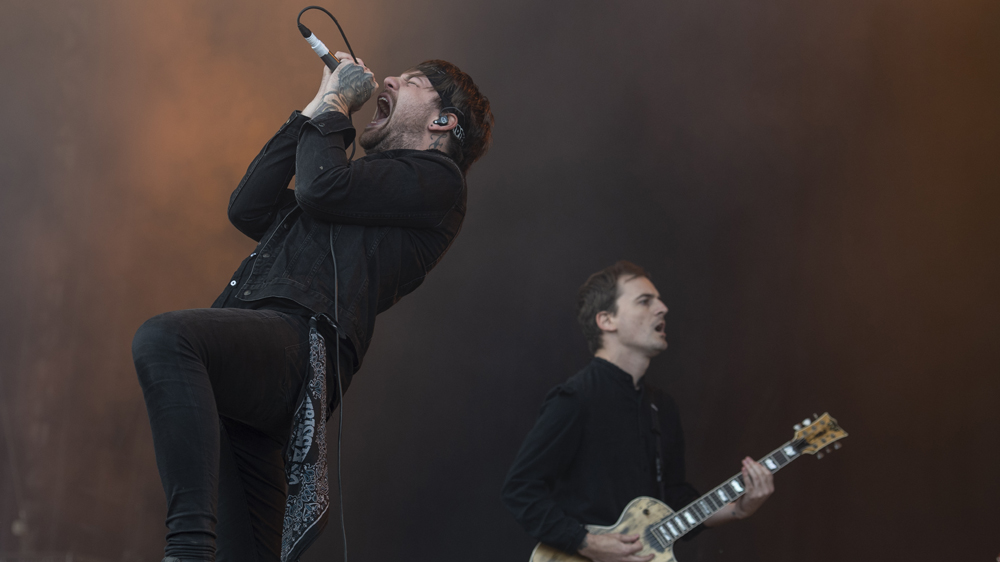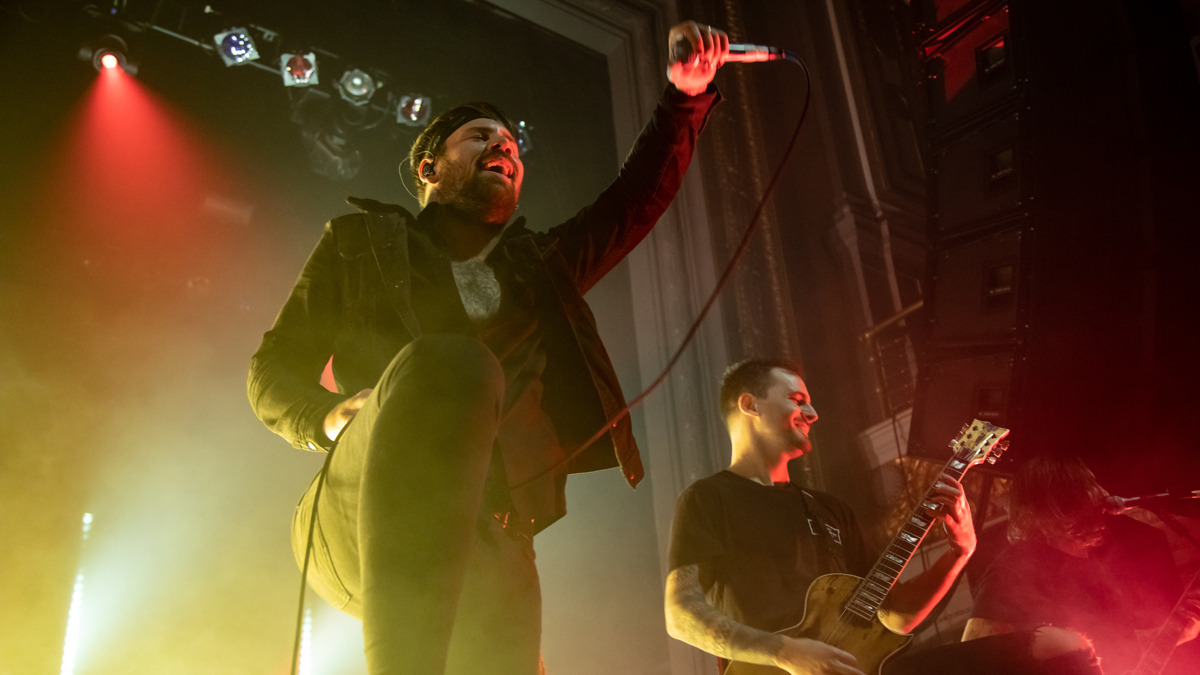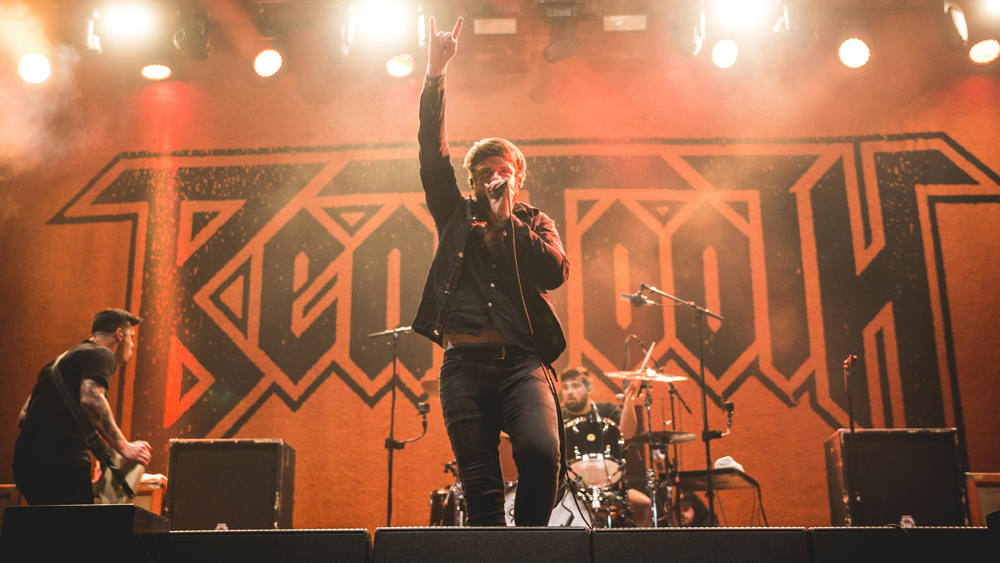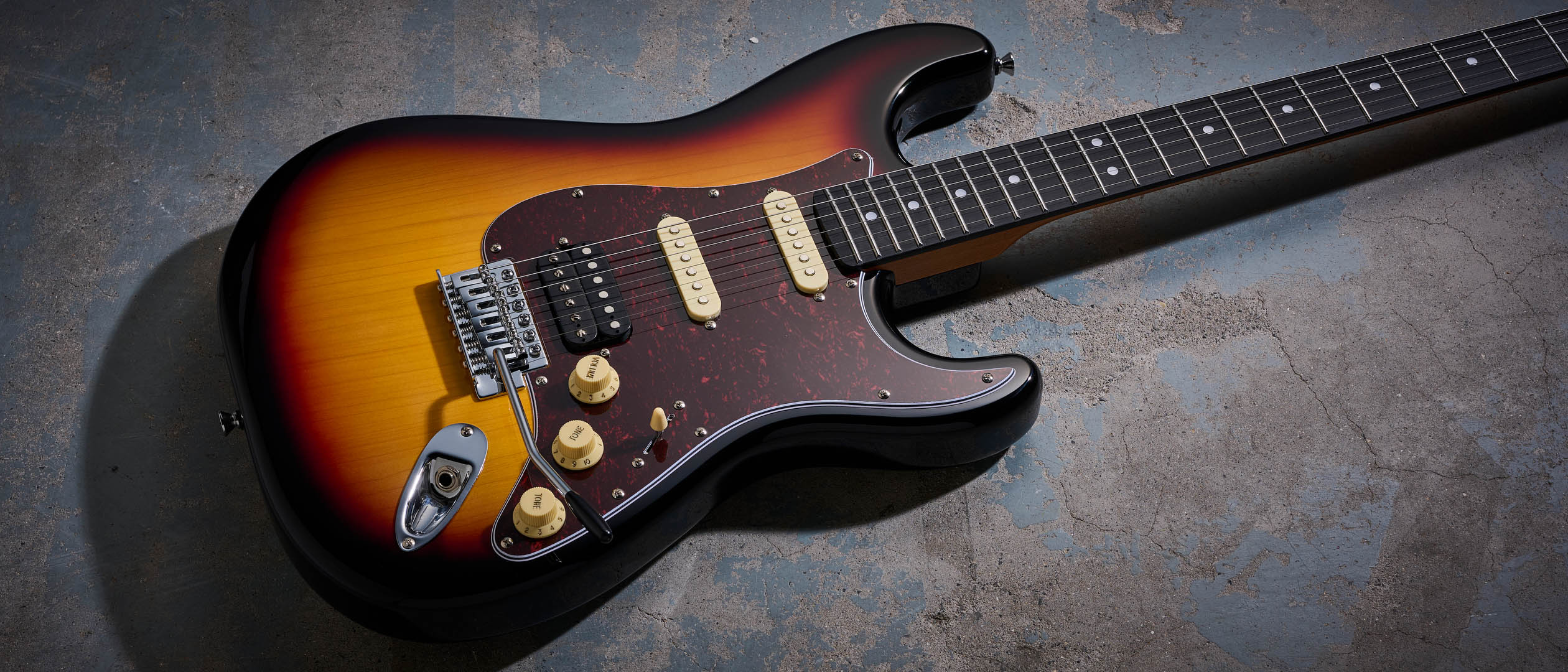Beartooth's Caleb Shomo: "With this album, it was about working the choruses into all of the riffs. The riffs were always the priority in the writing process"
The mastermind behind the melodic hardcore punk outfit discusses his love of Gretsch, writing on the road, and changing his approach to riffs on new album, Below

Caleb Shomo always knew Beartooth’s fourth album, Below, was going to be about the riff.
Having spent well over a year touring Disease, arguably the punk outfit's most pop-leaning record, Shomo wanted to kick things up a notch and put the emphasis back on high-octane chugs and killer riffage.
While Beartooth haven’t ever really gone soft, Below is sonically harder than anything else they’ve done – the result of immeasurable hours in the studio for Shomo, exploring crushing tones and experimenting with different layering techniques.
On record, Beartooth is Caleb Shomo. The 28-year-old frontman writes, performs, records and mixes everything that goes into their albums, which is remarkable considering the red-hot energy levels in the band’s blistering material, and on Below especially.
This could be in part due to Shomo working on this album in a little mobile studio while on tour in late 2019 and early 2020, writing and recording riffs with live shows fresh in his mind.
Shomo sat down to chat about what inspired Below and how he approached the recording sessions.
It probably feels like a lifetime ago, but do you remember what sort of headspace you were in when you recorded this? I read you started doing a lot of this stuff when you were on tour in 2019.
Get The Pick Newsletter
All the latest guitar news, interviews, lessons, reviews, deals and more, direct to your inbox!
"I mean, I'm always writing stuff pretty far ahead of time, but it got serious on the tour with the A Day To Remember in November of 2019, and that's when I started really working on the record. I had a small touring rig with a laptop and I got really into writing on the road. I mean, almost all of the music was written between November and March [2020]."
What inspired the move to start writing on the road?
"I just had never tried it before. I've always had a very strong mentality of when I'm on tour, I'm only on tour and that's all I'm focused on. I just thought, 'Why not try it? What's the harm in having a little setup with a guitar and a couple of pedals?' I can just plug in and put an idea down.
"Right out of the gate, I just became super-addicted to it. Having the energy of the shows, and being ab on tour and that's all I'm focused on. I just thought, 'Why not try it? What's the harm in having a little setup with a guitar and a couple of pedals? I can just plug in and put an idea down.

It definitely sounds – I don't want to say live, exactly – but it has a heavier, more in-your-face edge than your previous effort. Was that a conscious decision or something that naturally just came out of playing shows all the time and having music cranked up so loud every night?
"It was a bit of both. Going into this album I really wanted it to be like a much heavier record, and to be a lot more fast-paced, riff-driven. Beartooth has been kind of known for being a guitar riff-driven band and I just wanted to make sure that, with this album, we didn't back off and go a little more into the commercial world.
I wanted this album to go deeper into being about the riffs and being about the high energy. The riffs were always the priority in the writing process
"I wanted it to just go deeper into being about the riffs and being about the high energy. And then yeah, being on the road directly influenced the writing of the album."
Below straddles that line between what you guys do best, in terms of heavy riffs and massive choruses, more so than any other album...
"Yeah, definitely. I think just with what I like to write in general, choruses are always such a big part of what I love – hooks that are fun to sing along to and fun for me to sing. So no matter what, that's always going to be there, that's always going to be a really huge part of it.
"But again, it was almost more like working the choruses into all of the riffs. The riffs were always the priority in the writing process. Writing choruses that help highlight those heavier parts was more the mentality. With Disease, the approach was to write the chorus first and then build the song around it. This was kind of the opposite."
What do you think inspired you to take that more riff-led approach?
"I was listening to a ton of guitar-driven stuff: '80s thrash, Ride the Lightning-era kind of vibe, Slayer stuff. I was also listening to more stoner and doom bands – Sabbath, Sleep and High on Fire – stuff like that.
"And what that led to was... This is the first time that I distinctly changed the main guitar tone for Beartooth ever. It's always been an SG into a really hot Marshall with an EQ boost or an overdrive. For this, it's way more fuzz-driven and there are a lot more tuning changes, so there can be more low octaves. Just experimenting with a lot more stuff that influenced me."
From the get-go, I think the first thing I heard on Below sounded like a Tiny Terror. That kind of set the vibe.
"Well, there's a lot of different stuff going on. I didn't end up using the Tiny Terror on this, but I actually got really into this Dr. Z amp. I forget what it is exactly, but it's like a little 20-watt situation with a killer Friedman Oversized 212. So I was basically running like a [Boss FZ-2] Hyper Fuzz with a Bass VI through this Dr. Z, through a 212 with a Royer R-121 on it for just that booming, clean bass-y thing.
"I have a 100-watt [Marshall] Plexi [Super PA] that was modded by none other than Johnny Meyer, who I believe is maybe the best modder of Marshalls in the modern day. That thing absolutely melts bass.
"And the majority of the time I'm running everything through a Mesa/Boogie Rectifier Oversized 4x12 slant cab that I've had since my old band Attack Attack! made our first-ever gear order. So it's probably seen, you know, 500-plus shows. Now, it's super-broken in and sounds killer. Then I'll just have tons of various guitars."

Tell me a little about those. You’re a big fan of Gretsches, yeah?
"Huge, huge fan. For instance [picks up a Gretsch], this is a Chet Atkins from 1960 [7680 Super Axe] that I got not too long ago, and it absolutely sings. It's a really light guitar that resonates like crazy. When you're playing with the right amp, they literally are like talking to each other.
"I have a Gretsch Penguin that's kind of like a Les Paul-style guitar, which is an absolute beast that I've played with a lot. But honestly, man, this guitar [picks up a Gibson Explorer] was the main rig right here. I believe it’s an ‘82 Explorer. I do not remember what this pickup is but it's like some old-time random pickup from a random-ass brand in the '80s. That guitar has been killer.
"I actually put lighter strings on it and tuned everything up a half-step. So, instead of it being drop D it's a drop E flat. Doing something like that created a lot of really cool room for low end, instead of being down in like, drop C or drop B, and the octave under that kind of getting a little woofy and a little lost.
So many people think that going lower means that you're going to get more low end, and that's just absolutely not the case. It's about finding where the tight low end is
"So many people, I feel, really think that going lower means that you're going to get more low-end, and that's just absolutely not the case. It's about finding where the tight low-end is. I felt like it was a super-tight punch-y low, and I was able to add another Gretsch underneath, which was basically a Gretsch Bass VI. It's the Duane Eddy signature [G6120TB-DE].
"Tuning up the guitars gave me room to layer in like a Bass VI while still getting a clean low end from the bass guitar down the middle. It was all about just layering and experimenting."

After spending so much time with it at this point, you must be really itching to take it out on the road and see how people go for it. Is it going to be a challenge to recreate such a dense record on tour?
"Yeah, we've been jamming and it's been really cool to hear these things actually play out. And honestly, making these tones for a live setting has been wild. We actually switched over to Axe-Fx III before this tour, and I can't wait. I was having a tough time getting the Kempers as dialed in as I feel like they need to be.
Having something like a Kemper or an Axe-Fx is super helpful. They're so convenient, because we have so many different tones live
"I'd never really messed with Axe-Fx III. It's a really simple interface; it functions a lot like a plugin, which I'm very used to using. I mean, just the way their gain kind of breaks up just feels very real to me. And yeah, they're so convenient, because we have so many different tones live.
"Just in one song alone, on average both guitar players are switching between two or three different tones. One for the main riff, one plus an octave, one plus a fuzz, one plus whatever – there's so many different tones. Having something like a Kemper or an Axe-Fx is super-helpful. But yeah, I just landed on the Axe-Fx for this record cycle for touring and we're super-happy with it."
Your first big gig back this summer is just going to be a huge celebration for everyone involved.
"Yeah, we're gonna be going real crazy. Our first gig back is going to be in Vegas, in the middle of August, and it's going to be nuts. We're doing everything in our power to just make the show bigger, better, louder, faster and longer. What we're trying to do is make sure everybody gets their money's worth, that it sounds great and that it's a lot of fun. And yeah, you know, just keep pressing forward, getting better. But we can’t wait to get out there."
- Below is out now via Red Bull Records.
Chris is a contributor to Guitar World and MusicRadar with around 20 years of guitar playing experience – including writing for and recording various projects for around 15 of those. Outside of practical experience, he’s studied music throughout his life, with a particular focus on composition at university. He’s something of a 90s tragic and a sucker for anything with a groovy, metallic edge or psych and stoner vibes. Outside of music, he’s an avid cook, gardener, and rugby league lover.


![John Mayer and Bob Weir [left] of Dead & Company photographed against a grey background. Mayer wears a blue overshirt and has his signature Silver Sky on his shoulder. Weir wears grey and a bolo tie.](https://cdn.mos.cms.futurecdn.net/C6niSAybzVCHoYcpJ8ZZgE.jpg)

![A black-and-white action shot of Sergeant Thunderhoof perform live: [from left] Mark Sayer, Dan Flitcroft, Jim Camp and Josh Gallop](https://cdn.mos.cms.futurecdn.net/am3UhJbsxAE239XRRZ8zC8.jpg)






